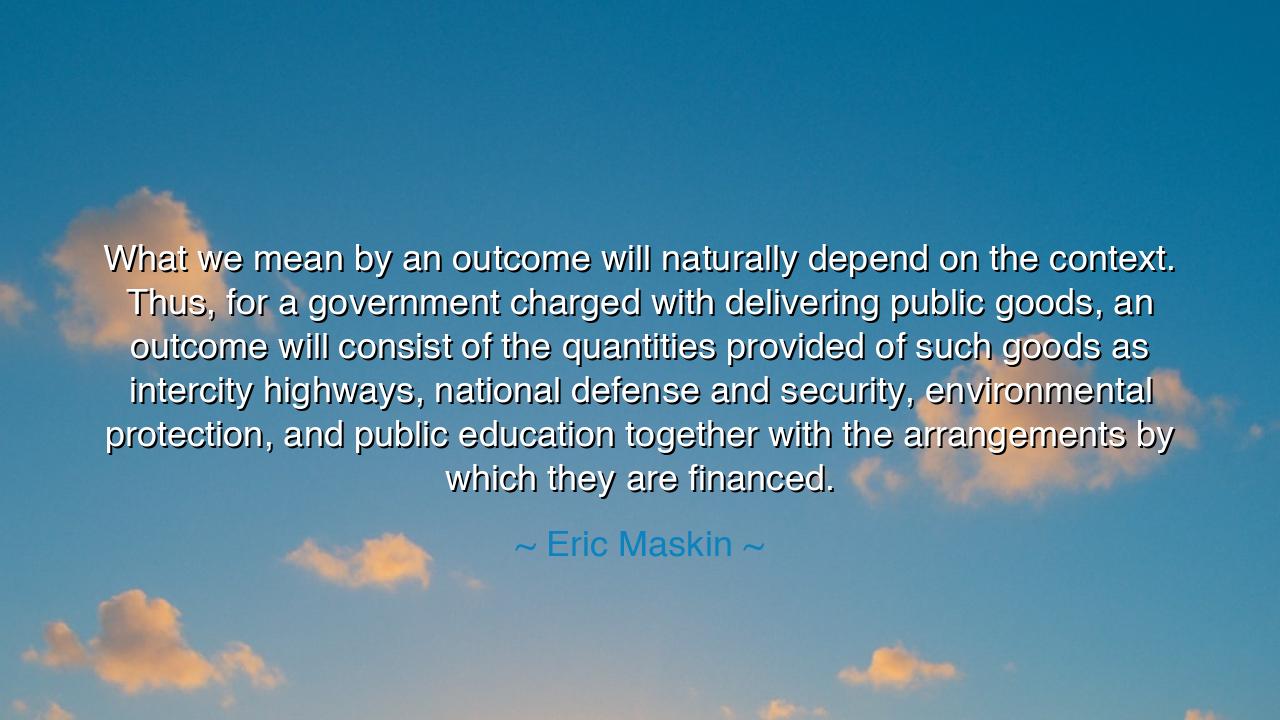
What we mean by an outcome will naturally depend on the context.
What we mean by an outcome will naturally depend on the context. Thus, for a government charged with delivering public goods, an outcome will consist of the quantities provided of such goods as intercity highways, national defense and security, environmental protection, and public education together with the arrangements by which they are financed.






Hear the measured yet profound words of Eric Maskin, Nobel laureate and thinker of governance, who declared: “What we mean by an outcome will naturally depend on the context. Thus, for a government charged with delivering public goods, an outcome will consist of the quantities provided of such goods as intercity highways, national defense and security, environmental protection, and public education together with the arrangements by which they are financed.” Though spoken in the cool language of economics, this truth glows with wisdom: that the worth of a government must be judged not by its promises or its politics, but by the outcomes—the tangible goods and protections it provides to its people.
At the heart of his saying is the recognition that context shapes meaning. An “outcome” for a family might be food on the table, warmth in winter, and hope for the children’s future. An “outcome” for a business might be profit, innovation, or survival. But for a government, entrusted with the care of millions, the outcome must be measured in the health of its public goods—roads that connect, armies that defend, schools that enlighten, and laws that safeguard both people and planet. Without these, government ceases to serve its purpose, becoming only a shell of power without substance.
History offers us vivid examples of this truth. Consider the Roman Republic, whose glory was not only in conquest but in the aqueducts, roads, and forums it built for its citizens. These were the public goods that bound the people to their state, giving them reason to trust and to belong. And yet, when corruption drained the treasury and bread could no longer reach the people, the Republic faltered, no matter the might of its legions. Outcomes failed, and so trust dissolved.
Or think of the Great Depression in America, when millions despaired as markets collapsed. It was not rhetoric that restored hope, but the building of public works, the creation of jobs, and the provision of education and security through Roosevelt’s New Deal. In those years, the true outcome of government was not measured in speeches but in dams, highways, and schools. Maskin’s words remind us that real progress is always grounded in what is built, what is taught, and what is safeguarded for the common good.
The wisdom also lies in his mention of financing arrangements. For it is not enough to build; one must build sustainably. A nation that provides generously without regard to how its wealth is gathered or spent soon burdens its people with crushing debt, or else hollows itself with corruption. Just as a farmer must sow in balance with the soil, so too must governments provide goods in balance with fair taxation, honest stewardship, and just distribution. Otherwise, the promised outcomes rot at the root.
This teaching, then, is not merely for rulers but for all citizens: judge your leaders by their outcomes, not their words. Ask not what they promise, but what they deliver. Are the roads strong, the schools alive, the people safe, the environment guarded? Do they arrange finances with honesty and wisdom, or with deception and waste? In these questions lies the measure of governance.
Therefore, children of tomorrow, take Eric Maskin’s wisdom into your own hands. Do not be dazzled by rhetoric nor blinded by ideology. Look always to the outcomes. Support leaders who build public goods with justice, and hold accountable those who squander wealth while leaving the people in want. Remember that the greatness of a government lies not in its ceremonies, but in the safety, prosperity, and dignity of its citizens. In this way, you will carry forward the ancient truth: that power exists not for itself, but to serve the common good.






AAdministratorAdministrator
Welcome, honored guests. Please leave a comment, we will respond soon